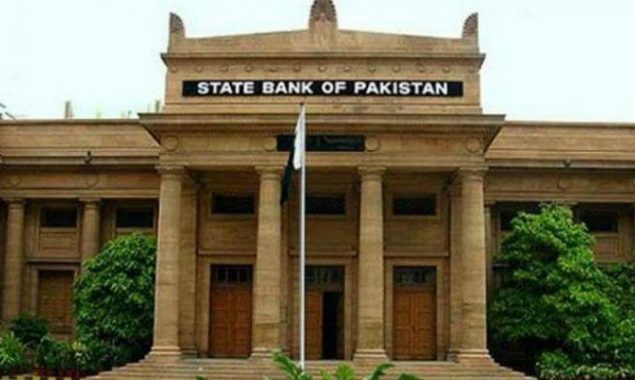
State Bank of Pakistan. Image: File
ISLAMABAD: Pakistan’s fiscal deficit narrowed to 0.8 per cent of the Gross Domestic Product (GDP) during the first quarter of the fiscal year 2021/22, according to the monthly Economic Update and Outlook for November released by the Finance Ministry.
Last year, the deficit during the period was recorded at 1.1 per cent of GDP, it said, adding that the revenue growth outpaced the growth in expenditures.
In absolute terms, the fiscal deficit has been reduced to Rs438.5 billion in the first quarter of FY22 against Rs484.3 billion in the corresponding period of the last year.
The primary balance remained in surplus and stood at Rs184.2 billion (0.3 per cent of GDP) in the first quarter of FY22 against the surplus of Rs257.7 billion (0.6 per cent of GDP) last year.
“The fiscal performance remained strong during the first quarter of the current fiscal year on the back of healthy growth in tax revenues, careful expenditure management and higher provincial surplus,” the report said.
During the period under review, the total revenues posted an impressive growth that outpaced the rise in expenditures.
The total revenues grew 22.3 per cent, primarily driven by 36.6 per cent growth in the tax collection from both federal and provincial levels.
Similarly, the total expenditures increased 14.5 per cent with 8.6 per cent growth in the current expenditures and 23 per cent rise in the development expenditures and net lending.
Within the development, the expenditures under the Public Sector Development Programme (PSDP) grew 63.2 per cent to Rs262.1 billion during the first quarter of FY22 against Rs160.5 billion in the same period of the last year.
Similarly, the cumulative surplus of all the four provinces was higher than the previous year, as it was recorded at Rs276.9 billion in the first quarter of FY22 against Rs44.4 billion last year.
The report also said the board was highly committed to further improve the tax collection through documentation and maximum taxpayers’ facilitation.
Meanwhile, the government was proficiently dealing with the Covid-19 challenges through timely effective measures, while it had speed up the vaccine process so that the economic activity remains on track without any disruption.
Increasing the expenditure on priority areas, the government is adhering to a strict spending management strategy.
The government has increased the spending on growth-oriented projects and is focusing on bolstering the social safety net through various Ehsaas poverty alleviation programmes.
The current fiscal performance reaffirms the government’s commitment to strike a balance between the fiscal deficits due to the Covid-19 and boosting the growth of the economy, keeping the primary balance at a sustainable level, and protecting social spending.
The government’s efforts to maintain fiscal discipline through an effective revenue mobilisation strategy and better expenditure management will continue to aid in further reducing the budget deficit during the current fiscal year, the report added.
The report also said Pakistan was on a high growth path, while at the same time, it is confronted with the persistent inflationary pressure.
The level and degree of persistence of inflation was the consequence of depreciation that followed the previous balance of payments crisis, reinforced by the acceleration of worldwide inflation and the exceptional surge in international commodity prices.
These events put a lot of stress on the external accounts, more specifically on the balance in trade of the goods and services and from there on the current account balance, it added.
The government aims at alleviating this stress as much as possible by implementing structural measures, as well as by demand policy management, according to the report.
In terms of demand management, fiscal consolidation, while protecting the vulnerable sections of the population from the surge in food and energy prices, is the main objective of the fiscal policy.
At the same time, the State Bank of Pakistan (SBP) is redirecting the monetary policy from an accommodative to a more neutral stance, it added.
Read More News On
Catch all the Business News, Breaking News Event and Latest News Updates on The BOL News
Download The BOL News App to get the Daily News Update & Follow us on Google News.




